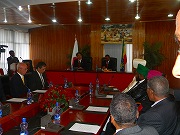|

|
|

|
| Ambassador's Speech>2011 >110623 | |||||
|
|||||
| at the Handing Over Ceremony of Donations for Tsunami Victims in Japan on 23 June, 2011 |
 |
||||
|
Your Excellency, Ato Hailemariam, Deputy Prime Minister and Minister of Foreign Affairs, Distinguished Guests, Ladies and Gentlemen, Endemen Walachehu. The 11th of March is a day the Japanese people will never forget. On that day, an earthquake and tsunami of unprecedented scale hit the Tohoku region off the Pacific Ocean. More than 27,000 precious lives were lost, and over 9,000 houses were destroyed. Several coastal cities were demolished. Even today, more than 40,000 people are still having a difficult time, living in evacuation centers. The nuclear disaster in Fukushima continues to be a source of concern. Every time we see audio-visual scenes of the tsunami hitting communities, our hearts ache. Words cannot express our deep sorrow over the devastation. Our prayers are always with the victims. More than three months have passed since that awful disaster. Looking back, I now realize how much we were helped by people all over the world. All kinds of support poured in from so many countries, support that helped people in Japan psychologically, financially and materially. Immediately after the news of this natural calamity, H.E. President Girma sent a letter of condolence to Prime Minister Kan. His Excellency also visited my residence to sign the condolence book on behalf of the Ethiopian Government and people. Meanwhile, a number of schools in Addis Ababa sent handmade condolence cards, paintings and posters. The Pan African Youth Union sent us a poster of encouragement with signatures of youth from over 50 African states. We received poems, flowers and individual donations. Several organizations initiated fund-raising and an environmental urban association dedicated their tree planting project to commemorating the victims of the earthquake and tsunami for the whole year. We have been very moved by so many expressions of sympathy and encouragement, and today is no exception. It is indeed a great honor for me to receive, on behalf of the Japanese people, the donations your committee has raised from wide-ranging quarters of Ethiopia. I am most grateful to Your Excellency, the Ethiopian Government, religious leaders, business leaders and so many other people in Ethiopia for your heartfelt concern, generosity and the solidarity shown with the Japanese people at the most difficult of times. Excellency, Ladies and Gentlemen, Japan and Ethiopia have enjoyed strong ties at all levels, not only between our two governments and through various ODA projects but also in academia, business and even grassroots exchanges for many years. Our two peoples have goodwill and mutual respect for each other. I believe that Your Excellency’s initiative at this time reflects this overall background. Today, untiring efforts continue to be made to rehabilitate the tsunami-hit areas in Japan. However, the areas damaged are so broad and the damage caused so enormous that it may take some time before we can get back to normal. The nuclear disaster in Fukushima is another difficult challenge. Day and night, every effort has been made to dispose of accumulated radioactive, contaminated water and to restore the functioning of the cooling system for the nuclear fuel rods. This will take more than half a year. In the meantime, every precautionary measure is being taken to ensure safety for food and human health. This is where we stand in Japan right now. Our challenges are formidable. Yet, I have no doubt that Japan can overcome this crisis and revive once again as a disaster resilient economy on the global scene. Despite the immediate difficulties, I would like to emphasize, Japan will remain committed to the peace and prosperity of Africa, as our Foreign Minister Matsumoto clearly stated in the TICAD Follow-up Ministerial Meeting held in Dakar last May. Our commitment to Ethiopia will also remain unchanged. Amesegenalehu. |
||||
|
|||||